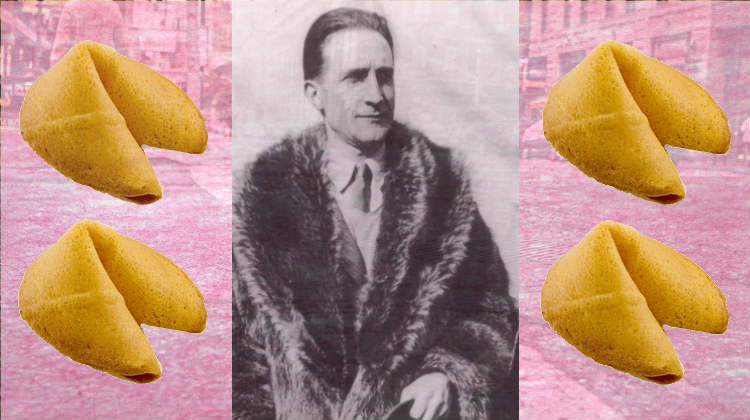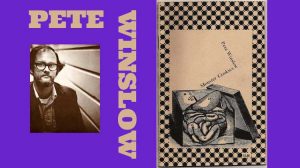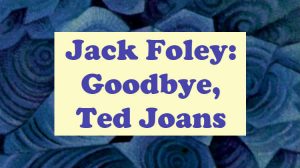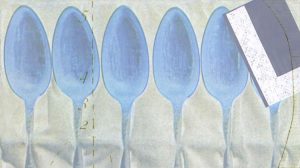
I walked out of the bookstore, grateful for fresh air. I looked up a poster announcing an upcoming reading by Karl Ove Knausgård.
I turned my head and looked at The Gluten-Free Bakery next door.
“I stay in the shade. It’s marvelous. Everyone else, however, heads for the sun to get tan; I hate it.” I turned to the voice coming towards me. I am absolutely certain it was Marcel Duchamp. He was leaning against a wall of posters and graffiti, pale as death.
Duchamp pointed at the bakery, asking me what a gluten-free bakery was.
“It’s fake food which makes people feel they’ll live forever,” I said, without thinking, shocked to see Duchamp, seemingly in the flesh.
“Amusing,” said Marcel Duchamp, taking a puff on his cigar.
Duchamp pointed to a poster announcing a reading by Karl Ove Knausgård “I did as few things as possible, which isn’t like the current attitude of making as many as you can,” he said.
I laughed, feeling at ease with my guru of the art world.
“That’s a wonderful quality,” I said. “To do less.”
“It’s important to breathe … to live life at a different tempo and different scale from the way most live.” Duchamp puffed on his cigar. “I look at myself from above – I see every action like a chess move – an endgame,” he said.
I wondered why Duchamp used the word “endgame.” Was he referring to Samuel Beckett’s play?
“I always think of you as Hamm,” I said.
Duchamp pointed to a poster: “Mad Men, starring Jon Hamm” – Marcel Duchamp looked delighted with himself, puffing on his cigar, pointing at the word “Hamm.”
For two years now I’d been collecting quotations by Marcel Duchamp. It was my hobby. Duchamp said I reminded him of Arnesberg, his principal American patron who, after quitting poetry, founded a society to prove it was Francis Bacon who had written all of Shakespeare. “His system was to find, in the text…allusions to all sorts of things; it was a game for him, like chess, which he enjoyed immensely. … Arnesberg twisted words to make them say what he wanted, like everyone who does that kind of work.”
I knew Duchamp would say this … but I was thinking about Samuel Beckett and his play.
Duchamp had a will of his own. He ignored my questions about Beckett, insisting I tell him something about Jon Hamm.
“Jon Hamm is an actor who plays Don Draper, the lead role in the television series called Mad Men,” I said.
Duchamp wanted to know more.
“Don Draper works in advertising. His job is to get people to buy things they don’t need.”
“Amusing,” said Duchamp. He told me of his escapades selling Picabias and Brancusis. He loved sales. He said Alfred Stieglitz rejected him for going into sales. “One has to eat,” he said.
“The shop window is proof of the existence of the outside world.” Duchamp pointed to the Glu-ten-Free Bakery, saying people believe they’ll get a cake which will give them eternal youth but it will only make them fat. Duchamp said all desire leads to futility.
He spoke about his “Large Glass,” “The Bride Stripped Bare by her Bachelors, Even.” “The penalty consists in cutting the pane and in feeling regret as soon as the possession is consummated,” he said.
“Well, Don Draper never seemed happy as a married man,” I said, thinking of the bride … and her bachelors.
“I realized early that it wasn’t necessary to encumber one’s life with too much weight, with too many things to do, with what is called a wife, children, a country house, an automobile,” said Duchamp.
Duchamp said he was just as free of the compulsion to work as an artist as he was of bourgeois encumbrances. His job as a librarian was a way of cutting ties with artists who took movements and programs more seriously than he. “It was a sort of excuse for not being obliged to show up socially,” he said.
“Eroticism is a subject very dear to me,” he said, “and I certainly applied this liking, this love, to my ‘Glass’. In fact I thought the only excuse for doing anything is to introduce eroticism into life. Eroticism is close to life, closer than philosophy or anything like it, it’s an animal thing that has many facets as is pleasing to use, as you would use a tube of paint, to inject into your production so to speak. It’s there stripped bare. It’s a form of fantasy. It has a little to do also… the stripped bare probably had even a naughty connotation with Christ. You know that Christ was stripped bare and it was a naughty form of introducing eroticism and religion…”
Duchamp spoke again of the impossibility of fulfillment.
“Sentimental love,” he said, “does not exist. I’ll tell you what’s good: friendship and affection. As for the physiological function that you have to be two for, well, it isn’t important at all, no more than dinner for two.”
“I would like to consider you my friend,” I said.
“I can call very few my friends.”
“It doesn’t matter between us,” I said. “You are dead. And I have all your words.”
An awkward silence followed.
Duchamp broke the silence by pointing at a flyer, asking me what global warming was. I answered and he laughed saying there were no greenhouse gases, just the gases of desire and the impossibility of fulfillment in this world.
“Is this why you never finished ‘The Large Glass?’”
“In the end you lose interest, so I didn’t feel the necessity to finish it,” he mumbled, looking at the posters of Mad Men.”
Duchamp pointed to a more recent Mad Men poster, asking me if I saw Season Seven.
“No,” I said. “The last show I saw took place in November, 1968,” I said.
Duchamp’s face took on a green tinge. He told me he died on October 2, 1968.
Duchamp looked down at his hands, then looked back at me and said, “ … art is an outlet toward regions which are not ruled by time and space.” He turned away from me, mumbling something about wanting to see the end of The Sixties.
“Don Draper wasn’t his name. His name was Dick Whitman. He stole Don Draper’s name be-cause Don Draper was dead. This was how Don Draper got out of the Korean War,” I said, wishing I hadn’t used the word “war” again. But it seemed ridiculous to talk about a television show with Marcel Duchamp in front of me.
Duchamp persisted in asking about Jon Hamm.
“He was a thief!” I screamed. “He stole a dead man’s name to leave the war.”
“I don’t want to talk about politics,” he said ….. ”
He looked angry. He pointed to The Gluten-Free Bakery, motioning me to go in.
“No,” I said. “you’ll desert me.”
“I was a deserter … ” he said, holding his hand out, motioning me to hand him my flip phone. “I should have been in La Résistance,” he said, insisting I go into the shop and experience the futility of the material world. He told me to find one thing, just one thing gluten-free which would satisfy my desires.
“No,” I said.
But, seeing his impatience, I knew I couldn’t say “no.”
Before I went in Duchamp said, ““I feel shame, not for the wrong things I have done, but for the right things that I have failed to do.”
I wanted to kiss him … but I turned and walked into the shop.
The Gluten-Free Bakery was just another shop selling useless products to the susceptible. I looked in The Refrigerator Section. There was nothing I wanted. Just coconut water and cookies made out of seaweed. I needed to go back to Duchamp … a woman tapped me on the shoulder. She had long gray hair and a skirt embroidered with bright, exotic birds. There were flowers in her hair. She held out a basket of pastel-colored things.
“Here, take a sample,” she said. “These are homemade gluten-free fortune cookies,” she said. “I make the dough myself. I make them with rice flour and unprocessed nuts. These fortunes are not done in a sweat shop. They are hand-written by me on organic rice paper and ink made of free range food dyes. You can eat the fortune after you read it; they’re sweetened with stevia. My sayings are too good for Twitter. “Here,” she begged, “take one,”
I strained to look outside. I couldn’t see Duchamp. I reached in and took a fortune cookie wrapped in pink.
“Try it and come back,” she said, calling after me as I left the shop.
“Marcel Duchamp!” I screamed to the air.
He was not there.
Someone was pulling on my arm. I looked down. It was a homeless man with a placard around his neck which said, “Vietnam Vet. Hungry. Homeless.” His barefoot feet were black and swollen. He smiled. He had no teeth.
“Can you give me a dollar?” he asked.
I reached in my bag and pulled out a dollar. When I leaned down to hand it to him I saw he was holding my flip phone.
“That’s my phone,”I said. “please give it back. Did you see a man? A man with a pink shirt with green stripes, a man with a gray face?”
“Can you give me five dollars?”
“I’ll give you five dollars if you give me my phone,” I said.
“That’s not enough,” He held the phone close to his chest.
“I opened my wallet. I counted nineteen dollars.”
“Here,” I said. “I have nineteen dollars. You can have it all if you give me my phone.”
“Hand over the cash,” he said.
“Only if you hand over the phone.”
“I’ll tell you what – you go across the street and buy me some chicken from that Halal truck. They won’t sell anything to me because I made the world safe for democracy. Bring the food back, give me your money and you’ll get the phone.”
I hesitated .. but …. “Okay. I’ll do it. But you better give me my flip phone.” My heart was racing, I was sweating. Where was Duchamp?
“Word of honor, lady. I’m an honorable veteran of Vietnam. I made the world safe for democracy. You can trust me.”
I rushed across the street and paid the guy in the Halal truck. I grabbed the chicken and rice dish. As I crossed the street the food started dropping out of my hands. I tried to retrieve it but it was useless. A truck or a bus or ….
OOOOOAAAAohhhhhhhh …. such pain. looking up at the sky, then that guy, the homeless Vietnam Vet – “My food,” he said, “my food. Give me my food.”
I could feel him grab my purse out of my hand …
Everything went black.
I woke enveloped in pain, my head pounding beneath bright lights.
“You’re next,” said someone dressed in green.
“Where is my purse? Where are my pills?”
“Your purse is at the foot of the bed.”
I tried to reach it but couldn’t sit up.
Someone handed me my bag.
I searched for my Oxycodone.
“Where are my pills? I need my pills….”
Someone in green came in. “You’re in a hospital. You can’t have your pills.”
I knew there were pills, scattered in the bottom of my purse. I searched and searched. The pain was intense … I fell back.
“ … please … the pain …. the pain …”
“You’re due for more morphine in half an hour,” someone said. “You’ll have to wait.”
I emptied my purse out onto my chest. It hurt to try and lift my head. I shoved my hand in, desperate for the possibility of a pill … if only …
All I found was the gluten-free fortune cookie, wrapped in pink. I opened it.
May you live in interesting times – Chinese Curse”





Leave a Reply